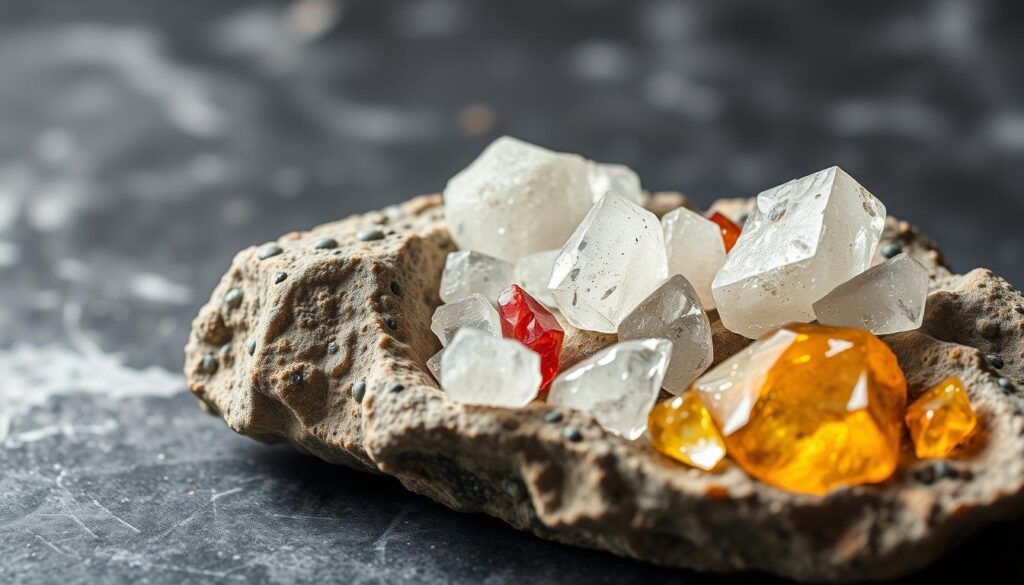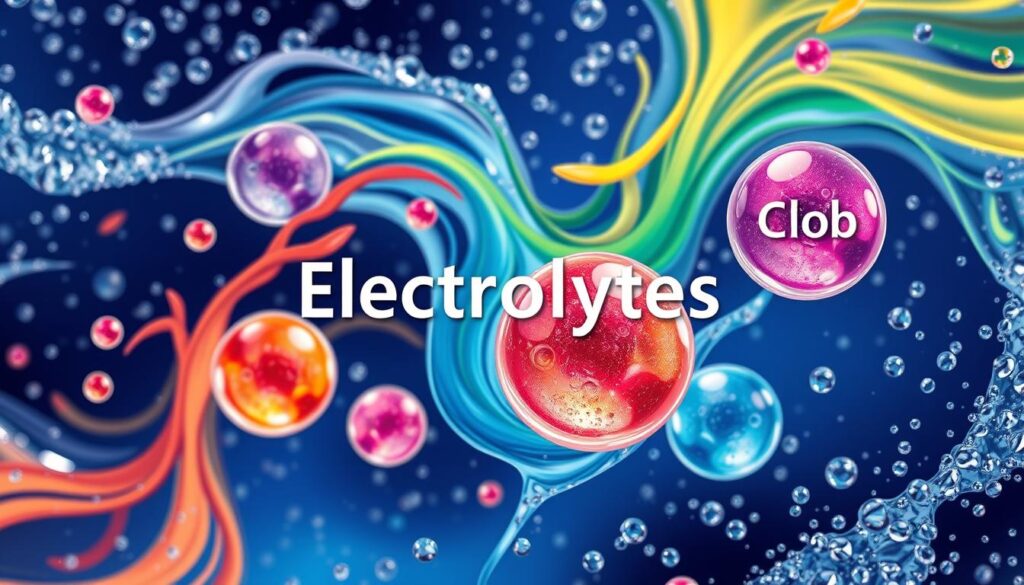Do you know how important minerals are for our health? While vitamins get a lot of attention, minerals like calcium phosphorus and magnesium are just as crucial. They help our bodies work right.
Minerals are found in foods and are different from vitamins because they don’t have carbon. They are split into two groups: macrominerals and trace minerals. Trace minerals include iron, manganese, and zinc.
Eating a variety of foods helps us get the minerals we need. Sometimes, doctors suggest supplements for people with certain health issues. Knowing about these minerals helps us make better food choices for our health.
Key Takeaways
- The body requires 7 essential minerals: calcium, phosphorus, magnesium, sodium, potassium, chloride, and sulfur.
- Minerals are divided into macrominerals needed in larger amounts and trace minerals needed in smaller amounts.
- Minerals play crucial roles in supporting bone health, muscle and nerve function, energy production, and more.
- A balanced diet is the best way to meet mineral requirements, but supplements may be recommended in some cases.
- Mineral toxicity can occur if consumed in excessive amounts, so it’s important to follow recommended guidelines.
Introduction to Minerals
Minerals are inorganic substances that are crucial for our bodies. They help with structure and function. Unlike vitamins minerals don’t have carbon. There are two main types: major minerals and trace minerals.
Difference Between Minerals and Vitamins
Minerals and vitamins are both important, but they’re different. Vitamins are organic and needed in small amounts. Minerals, on the other hand, are inorganic and needed in varying amounts. Some are needed more major minerals, while others are needed less trace minerals.
Categories of Minerals: Major and Trace
Major minerals like calcium, phosphorus, and magnesium are needed in larger amounts. Trace minerals, such as iron, zinc, and selenium, are needed in smaller amounts but are still vital.
Both types of minerals are important for our health. They help with bone and tooth structure, energy, and nerve function. Eating a variety of nutrient-rich foods usually meets our mineral needs.

Minerals are inorganic substances that do not contain carbon, unlike organic vitamins.
Major Minerals and Their Functions
The human body needs a balance of minerals to work well. Calcium, phosphorus, and magnesium are key for health and well-being.
Calcium Strong Bones and Teeth
Calcium is the most common mineral in our bodies, mostly in bones. It’s vital for strong bones and teeth, preventing osteoporosis. Eating enough calcium and vitamin D is crucial for bone health all our lives.
Phosphorus Energy Release and Acid Base Balance
Phosphorus helps with bone health, just like calcium. It’s also in cell membranes, DNA, and helps with energy and keeping the body’s acid-base balance.
Magnesium Muscle and Nerve Function
Magnesium is key for muscle and nerve function, and making energy. About 60% of it is in our bones. Studies show a link between magnesium deficiency and osteoporosis risk.
Eating a balanced diet with enough of these minerals helps. It supports strong bones, energy, muscle and nerve health, and overall well-being.

What are 7 minerals the body needs and their function?
The human body needs many essential minerals to work right. Among these, calcium, phosphorus, magnesium, sodium, potassium, chloride, and iron are key. Each mineral is vital for our health and well-being.
Calcium is key for strong bones and teeth. It helps muscles contract, nerves function, and blood clot. Adults need 1,000-1,200 mg of calcium daily.
Phosphorus helps bones with calcium. It also aids in energy and keeps body acid levels balanced. Adults should get 700 mg of phosphorus daily.
Magnesium is important for muscles, nerves, and energy. Men need 400-420 mg, and women need 310-320 mg daily.
- Sodium, potassium, and chloride are electrolyte minerals. They keep fluids balanced, control blood pressure, and help muscles and nerves.
- Iron is vital for carrying oxygen in the body. Men need 8 mg, and women need 18 mg of iron daily.
Eating a balanced diet with nutrient rich foods is key for getting enough minerals. This is important for our health and well-being.

Minerals are inorganic substances that are essential for the human body to function properly. They play a crucial role in many physiological processes and cannot be synthesized by the body, so they must be obtained through the diet.
Electrolytes Sodium Potassium and Chloride
Sodium, potassium, and chloride are key electrolyte minerals. They help keep the body’s fluid balance right and control blood pressure. Sodium and chloride are in the fluid around cells, while potassium is inside cells. They are vital for cell function, muscle movement, and nerve signals.
Roles in Fluid Balance and Blood Pressure
Electrolytes manage the water in and around cells. Sodium and chloride keep the fluid balance in check. They pull water into the fluid around cells. Potassium is inside cells and crucial for muscle and nerve work.
They also help with blood pressure. Sodium helps keep water in the body, which raises blood pressure. Potassium helps lower blood pressure by removing excess sodium and water.
| Electrolyte | Function | Recommended Daily Intake |
|---|---|---|
| Sodium | Maintains fluid balance, regulates blood pressure | 1,500-2,300 mg |
| Potassium | Supports muscle and nerve function, regulates blood pressure | 4,700 mg |
| Chloride | Helps maintain fluid balance, supports acid-base balance | 2,300 mg |
Keeping the right levels of electrolytes is key for health. Imbalances can cause muscle cramps, fatigue, and confusion. It’s vital to get enough electrolytes from food and sometimes supplements.

Trace Minerals Essential in Small Amounts
The body needs trace minerals in small amounts to work right. These minerals are key for health and feeling good.
Iron Oxygen Transportation
Iron is very important. It helps make hemoglobin, which carries oxygen in red blood cells. Without enough iron, the body can’t make enough hemoglobin. This leads to iron deficiency anemia and symptoms like tiredness, weakness, and pale skin.
Zinc Enzyme Systems and Insulin
Zinc is also crucial. It helps with enzyme systems, including insulin production. It keeps the immune system strong and helps skin, hair, and nails stay healthy.

Even though trace minerals like iron and zinc are needed in small amounts, they’re very important. Eating a balanced diet with lots of nutrient-rich foods helps the body get what it needs.
Mineral Toxicity and Safety Precautions
Minerals are key for our health, but too much can be harmful. It’s important to stick to the right amounts and get supplements only from a doctor. This keeps us safe from mineral toxicity.
Iron overload is a big worry, especially for kids. Too much iron can be dangerous and even deadly. Always keep iron supplements away from children and only use them as a doctor says.
- Too much mineral toxicity can cause stomach problems, damage to organs, and brain issues.
- Following safety rules and the right daily amounts is key to avoid mineral supplements dangers.
- Always talk to a doctor before starting mineral supplements to get the right dose and avoid side effects.
Eating a balanced diet with lots of nutrient-rich foods helps meet our mineral needs. Being careful with mineral intake and following guidelines helps us enjoy their benefits without risks.
In short, minerals are crucial for our health, but we must be careful. Knowing the risks of mineral toxicity and taking safety steps helps us keep our mineral levels right. This supports our overall health and well-being.
Getting Minerals from a Balanced Diet
The best way to get the minerals your body needs is through a balanced diet. This diet should include foods from all the USDA food groups. For example, dairy products are full of calcium. Vegetables and fruits are great for potassium.
Eating a variety of nutrient-rich foods is the best way. It helps meet your mineral needs without the risks of supplements.
USDA Food Groups and Mineral Sources
To get a wide range of minerals, eat foods from the USDA food groups. This is key for a balanced diet:
- Dairy: Milk, yogurt, and cheese are full of calcium, phosphorus, and vitamin D. They help keep bones and teeth strong.
- Fruits andVegetables: Leafy greens, citrus fruits, and potatoes are packed with potassium. This mineral is key for blood pressure and fluid balance.
- Grains: Whole grains like brown rice, quinoa, and oats are rich in magnesium. This mineral supports muscle and nerve function.
- Protein: Lean meats, poultry, fish, eggs, and legumes are good for iron, zinc, and selenium. These are vital for oxygen transport, enzyme function, and antioxidant protection.
By eating a variety of these nutrient-dense foods, you meet your mineral needs. You don’t need supplements with a balanced diet.
Eating a wide variety of foods is the best way to get all the minerals your body needs. – Registered Dietitian
Conclusion
Minerals are important for our bodies. They help with many things like keeping bones strong and helping with energy. There are seven key minerals: calcium, phosphorus, magnesium, sodium, potassium, chloride, and iron.
These minerals are needed in different amounts. But they all help our bodies work right. Getting minerals from food is the best way to stay healthy.
Eating a variety of whole foods is key. This helps keep our bodies in top shape. It’s important to know about minerals and how they help us.
Minerals are vital for our health. They help build strong bones and keep our immune system strong. Eating well and paying attention to minerals is important for our health.





